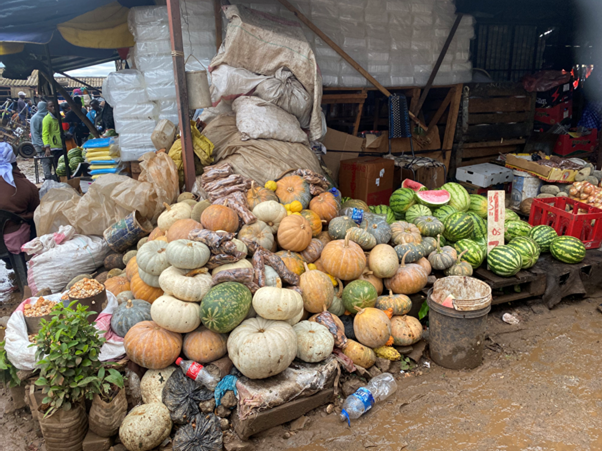Most market infrastructure built for vendors and low-income entrepreneurs in African countries end up abandoned due to lack of consultation – making the infrastructure less fit for purpose. In the spirit of fostering socio-economic justice, communities should be empowered to lead in building their own markets. Top-down solutions may be well-intentioned but people closest to the problem are often closest to the solution based on their relevant lived experience.

Fit for purpose internal market design
A market shed may look very beautiful for outsiders but internal designs and market stalls may not be ideal for commodities traded by the majority of traders. When consulted, the traders can ensure market stalls are designed to take care of three main functions that are dear to low-income traders- sales, display and storage. The display function saves to show the customer what is available while the sales function enables the trader to respond to the needs of different customers when they mention what they want based on what they see displayed. A trader does not have to dismantle the display by giving the customer what is on display but have to fetch from the storage.
Market stalls should also have space for the trader to seat and for more than two customers to be served at once. If usability, functionality and customer-friendliness are not taken into consideration when constructing an African territorial market, the infrastructure soon becomes a white elephant. Market designing should not be done by engineers but by people who care about doing the right thing in finding the right solutions based on real world data and practical experience. Commodities should also be displayed according to categories so that customers can see the broadness that enables making a choice. Seeing grains in one place enables choice-making unlike scattering commodities all over the market.
Toward community-led market development and user-design
Given that they share common aspects of background and identity, African territorial market traders are uniquely positioned to inform market designs that meet the needs of their members as well as their customers. An elite market is often shunned by local income consumers who associate an expensively built market with expensive products. Community-led market development that is led by the users can prevent some of these challenges as opposed to wasting money building shopping malls without talking to intended users.
Instead of relying on academic researchers and expensive consultants in conducting market research for new market infrastructure, a down-to-earth approach should involve local consumers and vendors who have been quietly making sense of consumption patterns for decades although without documenting the trends. If those closest to the market problem are closest to the solution, they should be equipped with enough funds to lead their own investigations, develop their own markets and implement their own solutions. With enough capacity, a territorial market community can easily identify a market issue, collect and analyse information about it as well as propose and implement a solution, with minimum support from outsiders or local knowledge brokers. This process can give birth to a very important inclusive research culture and elevate community leadership in knowledge generation.
It is time to move away from top-down approaches that enable those who are often removed from everyday community experiences to shape research inquiry and translate that to inappropriate market infrastructure. Extractive research funding that promotes power imbalance between external researchers and territorial market actors tend to restrict the scope of market investigation, yielding incorrect results that do not reflect communities’ lived experiences or concerns, and perpetuates systemic inequities. This is different from community-led research which attempts to build on the successes of community-engaged methods and participatory approaches by positioning community members as leaders of the research process.
Modernization should add value to existing knowledge
A wrong impression has been created that vendors and low-income traders who shun modern market infrastructure are against modernization. That is far from the truth. The issue is about involving users in conceiving, designing and building market infrastructure. Modernization should add value to existing knowledge because knowledge has more substance than infrastructure. African delegations who have been sent by their governments to study markets in Eastern Europe with a view to importing market infrastructure models have just looked at buildings but forgot to find out how markets in those countries function. Anyone can put in place a building. The most important part is making the building function according to the expectations of the users.
What makes a university unique is not a collection of buildings at a university campus but the knowledge generated in those buildings. Central Business Districts (CBD) in many African cities are becoming ghost towns because municipalities have failed to consolidate fragmented knowledge and information held by business actors most of whom have moved away from the CBD with their knowledge to set up shop in new locations. On the contrary, territorial markets thrive on intricately organized undocumented knowledge system invisible to investors and local authorities.
Due to foresight on how territorial markets function and capacity to read the directions of the economic winds of change, African territorial markets actors are capturing more than 70 percent of the business entrepreneurship from formal companies. Investors keen to invest in African market infrastructure should first master these critical trends. That will avoid cases where investors put a $1 million dollar market structure for vendors and traders who earn less than $5 a day. Someone who earns less than $5 a day cannot invest all of it in a bank at the end of the day because s/he wants to use part of the money for tomorrow’s business. To be transformational, growth for these actors should be incremental based on their hard-earned knowledge and wisdom.
Charles@knowledgetransafrica.com / charles@emkambo.co.zw /
Website: www.emkambo.co.zw / www.knowledgetransafrica.com
Mobile: 0772 137 717/ 0774 430 309/0712737430
